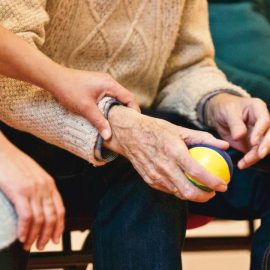

This article gives you a glimpse of what you can learn with Shortform. Shortform has the world’s best guides to 1000+ nonfiction books, plus other resources to help you accelerate your learning.
Want to learn faster and get smarter? Sign up for a free trial here .
How is self-discipline different from willpower and motivation? What role does self-discipline play in a fulfilling life?
It would be difficult to overstate the importance of self-discipline in life. By examining the works of David Brooks, Dietrich Bonhoeffer, Jocko Willink, and others, we’ll see how self-discipline puts you in control of your own life, leads to better health, helps you reach your goals, and builds character.
Continue reading to understand what self-discipline is and learn about the importance of self-discipline.
What Is Self-Discipline?
Before we look at the importance of self-discipline, let’s get clarity on what it is. The dictionary defines self-discipline as your ability to control your feelings and overcome your weaknesses; it’s you training yourself, typically to improve. In Discipline Equals Freedom, Jocko Willink defines self-discipline as a steady, internal force that drives you to take action and “be better.”
It’s important to note two aspects of Willink’s definition: “steady” and “internal.” These specifics help us distinguish self-discipline from willpower and external forces. We’ll also examine the difference between self-discipline and motivation and how the two can be used together for maximum impact.
Self-Discipline vs. Willpower
Willink’s concept of a steady force syncs up with how the dictionary defines self-discipline as training. Willpower is your decision to do (or not do) a particular thing despite your impulses. It’s an instance of self-control. When willpower is exercised again and again, it equates to self-discipline.
According to Willink, self-discipline is consistent willpower that you exert over your mind and body enabling you to do what’s necessary despite your feelings or external influences.
Self-Discipline vs. External Influences
Self-discipline is, by nature, internal (hence “self”). Willink explains that external influences such as a motivational speaker or a drill instructor are temporary and outside of your control. Thus, they’re not as reliable or effective long term. It’s wise to use external influences as a supplement to, not a replacement for, self-discipline.
Self-Discipline and Motivation
Willink discredits the dependability of motivation, but some say that motivation is essential for the initial formation of a goal and that discipline comes second. And, in fact, Willink’s own process of finding a “why” to drive his discipline aligns with the definition of a “motivator” referred to here—that is, an underlying reason to make a meaningful change in your life.
Research shows that certain motivations are likely to be effective for achieving long-term goals. Psychologists distinguish two types of motivation: extrinsic and intrinsic. Extrinsic motivation is similar to what Willink describes: a drive based on external reward or punishment. For example, this could be a car you’re saving money to buy or your fear of disappointing a parent. In contrast, intrinsic motivation is your drive to do what you innately enjoy or are interested in. For example, you like waking up to hike at dawn because of the wildlife you’re interested in viewing and the pleasure of watching the sunrise. In a study observing the effects of different motivation sources on long-term weight loss, external motivation was shown to be short-lived and ineffective, while intrinsic motivation was long-lasting and effective.
Based on this research, a clinical nutritionist makes the case that intrinsic motivation and discipline are required to reach your goals and achieve long-lasting health. In this view, discipline is essential to perform the daily habits that lead to your goals. However, you should try to form habits that you’re intrinsically motivated to do because these are shown to be the most sustainable. For example, if your goal is to lose weight and you enjoy community atmospheres, consider joining a local soccer league or a running club.
Willink seems to intuitively recognize the value of enjoying your habits. For example, he emphasizes the importance of having fun while practicing jiu-jitsu. But what about goals that require habits you aren’t intrinsically motivated to do?
The clinical nutritionist’s view is that intrinsic motivation might form after you perform a habit over time. For example, you don’t like regularly reading for a history class in college, but you eventually develop an interest in Ancient Rome that drives your reading habits in that subject.
The Importance of Self-Discipline
We’ll unpack the importance of self-discipline by looking at four ways it makes a difference. Self-discipline puts you in control of your life, leads to better health, helps you reach your goals, and cultivates character.
Self-Discipline Puts You in Control of Your Life
Willink discusses the importance of self-discipline in terms of control, arguing that self-discipline makes you the master of yourself. By cultivating and practicing self-discipline, you gain control over your thoughts and actions. This allows you to overcome bad habits, false excuses, distractions, and emotions in order to effectively accomplish daily tasks that lead to your long-term goals. Therefore, by removing self-imposed obstacles, self-discipline frees you to live the life you want most.
In Who Will Cry When You Die? Robin Sharma discusses tactics for getting a handle on your life. One of them is to develop self-discipline. He believes that, in developing self-discipline, you choose to make active decisions in your life, rather than letting life happen to you—a form of seizing control.
In The Daily Stoic, Ryan Holiday and Stephen Hanselman explain that the Stoics equate self-discipline (also referred to as temperance or moderation) with being the captain of your ship, not the passenger. Stoics argue that, to practice self-discipline, you must actively make sense of life with reason. Through reason, you can control your view of life: the foundation of your understanding, your intentions, and even your actions. The Stoics assert that, when you don’t actively use reason, you end up a passive participant in life controlled by circumstances, emotions, and unchecked desires and thoughts.
Self-Discipline Leads to Better Health
Willink discusses the importance of self-discipline in regard to physical health. Health allows you to do more in life. You can control your health to some degree through healthful habits. Habits require self-discipline.
Willink contends that self-discipline makes you healthier. When you take control over your actions, you have the power to resist unhealthful temptations. Instead, you’ll be able to develop and maintain habits that keep you healthy—like a clean, nourishing diet and a regular exercise routine.
Health professionals recognize the crucial role of discipline in good health. Describing the basics of weight loss, Mayo Clinic highlights commitment to changes in diet and exercise habits as the key to successful weight loss. In this context, “commitment” seems nearly synonymous with Willink’s definition of “discipline”—that is, an internal force that drives you to take action and improve. However, the Mayo Clinic’s idea of commitment seems to differ from Willink’s idea of self-discipline in that it’s not limited to an isolated, internal struggle for self-control. The Mayo Clinic suggests recruiting your doctor and loved ones for support in your health journey.
Self-Discipline Helps You Reach Your Goals
Next, let’s examine the importance of self-discipline in regard to success in life. In The One Thing, Gary Keller draws a connection between habits and goals and explains the role that self-discipline plays. Success, he says, results from applying self-discipline long enough for a new habit to stick and become automatic.
When you exercise discipline, you’re training yourself to act in a certain way. When you do it long enough—research shows it takes 66 days to establish a habit—the new behavior becomes routine. You become successful when you’ve strategically applied self-discipline to the right thing—establishing a powerful new habit.
Keller cites Olympic swimmer Michael Phelps as an example of someone succeeding through strategically applied discipline. As a child with ADHD, he couldn’t focus in school and was prone to disruptive behavior. However, from age 14, he applied discipline to One Thing that became a powerful habit—swimming every day. Phelps swam six hours a day, seven days a week, and ultimately became the most successful Olympian in history.
Willink makes a similar point, arguing that self-discipline helps you reach your goals and realize your full potential. Most of us have dreams and aspirations about things we want to accomplish or the type of person we want to be. Willink contends that, even if you don’t have a clear vision for yourself, you’re likely capable of many great things. You might even have talents or resources to make certain goals more attainable. However, it’s discipline that helps you take control of your life and drive the actions necessary to develop good habits, reach your goals, and become the best version of yourself.
The 5 AM Club also discusses practical ways to discover your potential through self-discipline. This starts with waking up at—you guessed it—5 a.m. and using the first hour of your day to perform a self-improvement routine consisting of exercise, reflection, and professional growth.
Self-Discipline Cultivates Character
We’ve discussed how self-discipline is willpower exercised consistently over a period of time. It’s a form of personal training. Over time, you see success through accomplished goals (as we covered in the previous point), and you see a positive change in yourself. This is called character-building, which is the fourth area in which the importance of self-discipline is evident.
Robin Sharma explains that, when you exert discipline over yourself, you make choices that are unpleasant in the short term but better for you in the long term. By putting in the work to improve yourself, you don’t wait around for the world to force you to improve—an experience that’s usually more painful, claims Sharma.
The authors of The Daily Stoic explain that the Stoics believed that a virtuous life starts with self-discipline. David Brooks would agree. In The Road to Character, he contends that virtue is made, not born. Self-discipline and strict behavior, he says, can create a virtuous person.
Brooks shares lessons from Dwight D. Eisenhower’s life to illustrate character-building through self-discipline. Eisenhower, the general who commanded the Allied invasion of France and later became U.S. President, was brought up in a strictly disciplined household. His mother, Ida, forced the boys to learn good self-discipline and habits from a very young age. She insisted they start their chores at dawn, study for school, and read the Bible aloud daily.
The young Eisenhower struggled with a temper that could easily flare into a volcanic rage. In an essay he wrote when he was 76, he described how, when he was young, he threw a red-faced tantrum because he wasn’t allowed to go trick-or-treating with his older brothers on Halloween. His father punished him and sent him to bed. Ida came to his room and read to him from the Bible, gently explaining that he needed to learn self-control. Eisenhower described this event as one of the defining moments of his life—learning that he needed to find a way to control his knee-jerk temper.
The Eisenhowers aren’t the only ones who draw a value for self-discipline and an appreciation for its role in character-building from the Bible and the Christian faith. Dietrich Bonhoeffer, the author of the Christian classic The Cost of Discipleship, asserts that severe self-discipline is an indispensable part of discipleship—following Jesus and becoming more and more like Jesus in character.
Bonhoeffer explains that experiences are an internal conflict between the Holy Spirit, which desires to do the will of Jesus, and your own sinful nature, which desires pleasure and comfort, even at the expense of others. It takes enormous self-discipline to overpower your selfish human nature so that you can yield to the Spirit and do the will of Jesus. According to Bonhoeffer, the only way to develop this level of self-discipline is through voluntary forms of suffering, such as fasting.
Bonhoeffer cautions that fasting and asceticism in general should be used only as a tool to cultivate strong self-discipline. If it becomes an end in itself or a point of pride for you, then it becomes self-defeating, just like taking pride in your humility.
Wrapping Up
As we’ve looked at the importance of self-discipline in living a healthy, fulfilled life and becoming the person you want to be, you should feel challenged but also inspired. By nature, it’s not easy. But, it’s possible. Others have embraced the importance of self-discipline—to tremendous results—and you can do the same.

Want to fast-track your learning? With Shortform, you’ll gain insights you won't find anywhere else .
Here's what you’ll get when you sign up for Shortform :
- Complicated ideas explained in simple and concise ways
- Smart analysis that connects what you’re reading to other key concepts
- Writing with zero fluff because we know how important your time is






